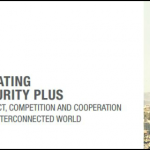The following is an excerpt from the Debating Security Plus 2018 report published by Friends of Europe.
Once regarded as small and random acts with a mere nuisance value, hybrid threats have evolved from the actions of non-state actors to include transnational, organised criminal networks and, from 2014 onwards, to feature state-actors with well-planned and advanced operations that take advantage of the multiple vulnerabilities that have emerged in today’s fluid security environment.
It has been argued that hybrid threats represent a “weaponisation of globalisation” that poses a direct threat to democratic states’ decision-making processes while stopping short of the direct use of military force.
This was the second successive year in which hybrid threats were discussed in Debating Security Plus. The debate broadly focused on disinformation campaigns, threats to elections and democratic systems in the West, building national resilience and using military strategies against hybrid threats.
Although discussions on how to counter hybrid threats have risen to prominence in Europe, there is a clear necessity to raise understanding on the nature of the threat. Some debaters stressed that wars have always contained hybrid elements because states used all the available tools to fight: military, non-military, kinetic and non-kinetic. Others disagreed, arguing that the increasing role of technology in people’s lives and the vulnerabilities that it has entailed have brought out a new threat, which can be categorised as hybrid.
Debaters emphasised a greater need for international and multilateral institutions to define hybrid warfare more comprehensively, especially in international law and treaties. There were calls to work with the private sector to ensure that authorities can keep pace with technological change and prevent rogue actors from staying ahead of the game.
A better understanding of how today’s social media networks work as opinion builders and news generators is required at all levels; in particular there needs to be a greater awareness of how digital social platforms are used to amplify radicalisation processes. Digital methods have changed the way interaction happens in today’s world and the change is here to stay. There was also a wide consensus on how inequalities in global access to quality education are one of the most influential challenges in countering radicalisation. A comprehensive response is needed because there are no simple solutions or magic tricks to solve the problem.
Tackling hybrid threats requires a whole-of-society approach, debaters said, ensuring citizens become critical players by instilling a culture of cyber-hygiene and cyber-safety. In particular, there should be a focus on working with schools to improve media literacy in response to disinformation. Italy’s work in this field – spearheaded by the Ministry of Education and the President of the Italian lower house of Parliament as an example of successful top-down leadership – was praised. Several other countries have also addressed the problems relating to media literacy in the education system. In Finland, for example, it has been embedded into school curriculums.
Among the recommendations that emerged was the idea of developing private-public partnerships to find ways to quickly identify perpetrators of cyber-attacks, possibly using an open-source platform based on blockchain technology to securely distribute identity signatures. There were proposals to strengthen protection for electoral infrastructure to prevent results being slewed by hackers and calls for greater efforts to build up more trust among the public and between governments and international agencies, particularly to ensure better information sharing between EU member states and between NATO and the EU. Each country should see how the whole-of-society approach for countering hostile influence can be developed within their own specific context. Regulation efforts must focus on both the individual and collective side, maximising the level of media ownership transparency and building responsibility for what is published and said.
Sameer Patil is Fellow, National Security Studies and Director, Centre for International Security, at Gateway House. Sameer was a moderator for Theme 1: Countering Hybrid Threats in the Cyber Age as part of Debating Security Plus 2018.
Utsav Gandhi is Marketing and Outreach Coordinator, at Gateway House.
Hanna Smith is Director of Strategic Planning and Responses, at European Centre of Excellence for Countering Hybrid Threats (Hybrid CoE), Finland
Päivi Tampere is Head of Communications, at European Centre of Excellence for Countering Hybrid Threats (Hybrid CoE), Finland
Debating Security Plus (DS+) is a global online brainstorm with the aim of crowdsourcing policy recommendations to the world’s security threats. This year there were about around 1,200 participants from 86 countries, and 37 VIP debaters. You can read the full report here.
You can read exclusive content from Gateway House here.
For interview requests with the author, please contact outreach@gatewayhouse.in.
© Copyright 2017 Gateway House: Indian Council on Global Relations. All rights reserved. Any unauthorized copying or reproduction is strictly prohibited


